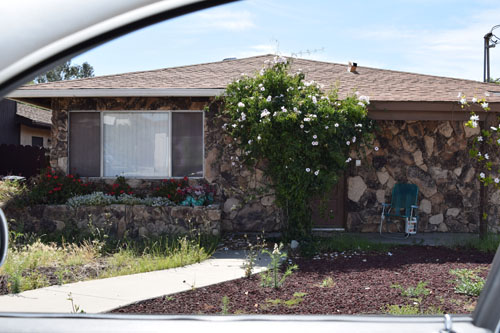
— 33rd in a series —
Exit 10, College Avenue, San Diego ~ Mikvah Israel
By Donald H. Harrison

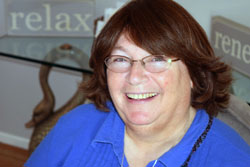
SAN DIEGO—Susan Shapiro estimates that 200 women in San Diego County regularly go to a mikvah (ritual bath) every month to infuse their marriages with spirituality and passion. Of these, the mikvah attendant estimates, between 60 and 80 visit Mikvah Israel in a quiet neighborhood near San Diego State University. The others utilize mikvahs in La Jolla and in Poway.
Mikvah Israel occupies the back portion of a duplex at 5170 La Dorna Street. The front portion of the home, sealed off from the back, is rented to an unrelated tenant. Entering the back portion of the house, one encounters a reception area where one may wait until a preparation area becomes free.
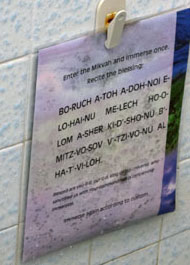
In the preparation area, which is a well-supplied shower and bath room, a woman after seven days following the cessation of her menstruation, is commanded by Torah (Leviticus 15, 18) to cleanse her body thoroughly from “top to bottom.” For example, she will remove all nail polish, make-up, hair-dye, anything that would come between her natural self and the waters of the mikvah pool. Mikvah Israel has two such preparation rooms and two mikvah pools, both attached to a source pool which initially had been filled with ritually-required rainwater.
When a woman has completed her preparations (which she may also do at home), she will call for the mikvah lady to escort her to the mikvah pool. There she will immerse herself completely, dunking under water three times. She will recite a blessing (conveniently transliterated on a waterproof card affixed to the wall of the mikvah pool) and when she leaves the mikvah, the attendant will hold a robe for the woman as she emerges, preserving modesty. An observant Jewish woman will resume sexual relations with her husband only after she has participated in this monthly rite.
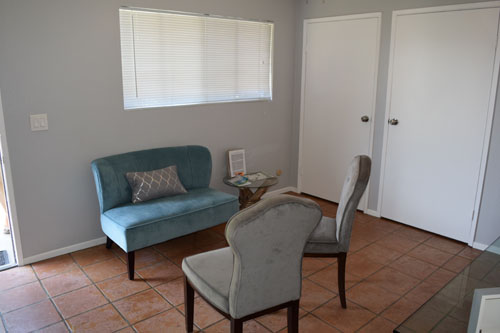
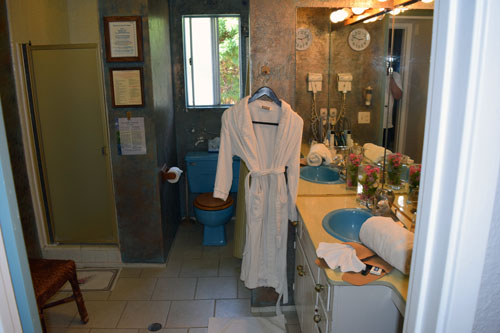
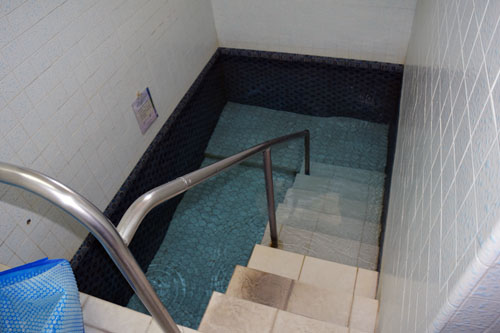
Shapiro has been a mikvah attendant for 28 years. Not long after she and her husband moved to San Diego from Cape Town, South Africa, they wanted to send their children to the Chabad Hebrew Academy but tuition was a problem on the salary of her husband, Aharon Shapiro, a mashgiach (one who supervises kashrut.)
So, Senior Chabad Rabbi Yonah Fradkin suggested that she take a job as a mikvah lady (there are five at this facility) to defray the expense. In that she, herself, was a regular user of the mikvah, Shapiro was quite familiar with its rules and procedures. Her children have long since graduated from the Chabad Hebrew Academy, but Shapiro, who lives within walking distance of the mikvah, continues at her post. It is clear that she feels fulfillment in helping others to observe the mitzvah (commandment) of mikvah.
Mikvah Israel is available only to married Jewish women whose husbands also are Jewish, Shapiro said.
“Any mitzvah you do gives you an extra spiritual connection,” she says. “There is a concept that when you are in the water, and you are literally not touching anything – when you pull your feet up from the floor—you literally feel like a baby in the womb. You are spiritually and physically getting reborn.”
Furthermore, said Shapiro, “the whole idea of the water in the mikvah whether it was snow or rain—natural water—is that it was connected to all the waters of the Earth, including those that flowed through the Garden of Eden. In this way, we are connected to all the women through all the years and all the generations.”
It is particularly emotional, she said, when a bride-to-be is brought to the mikvah by her mother, and sometimes by aunts and grandmothers as well, in celebration of the fact that the mitzvah is being passed on, generation to generation, Shapiro added.
In addition to saying the prescribed Hebrew prayers, a woman, while in the mikvah, may linger in the waters for more personal prayers or meditations.
Shapiro has observed some transcendent moments. While names of mikvah users are kept private, Shapiro felt free to relate one of her most memorable experiences. She recounted that one woman came to the mikvah wearing “a tanktop and slacks—obviously not an Orthodox woman (who would have covered her body from foreign eyes)—and she got herself ready, knocked on the door to call me to escort her, and in the pool she started making the baracha (blessing) and then she started sobbing, so much it was like she was making tidal waves in the pool.
“One of the things we don’t do is talk when they are in there; it is just not the place for chitter chatter,” said Shapiro. “She came out, and I said ‘I don’t know your story but you clearly need a hug.’ I gave her a hug and she started sobbing on my shoulder, telling me the doctors told her that there was no way she could have children, and that her rabbi said ‘you need to go to the mikvah.’
“I asked her if she had been to the mikvah before, and she said she went when she first got married but then when she didn’t have children, she became upset about it and stopped coming. So I said to her if she made a commitment to this mitzvah, I was sure that Hashem would give her a blessing. It was one of those strange things, I had no right to promise anyone anything, but the words came out….
“Three or four months later she called for an appointment. You know you never ask any woman if she is pregnant, that is etiquette, but when she walked in, I said, ‘I don’t normally ask this question but (pointing to the bump in her tummy) what is this?’ And she said to me, ‘I got pregnant that night!’ – after the doctors had told her there was no chance she could get pregnant. So we sobbed and we hugged…”
A postscript to the story: Two of Shapiro’s daughters had babies only two days apart. And the woman from the mikvah had a baby boy, on the day exactly between the births of the mikvah lady’s two grandchildren.
Shapiro notes that observing Jewish laws of family purity—that is, waiting for seven days after menstruation before resuming sexual relations—generally means that married couples will engage in sexual intercourse at approximately the same time as the woman ovulates. Coupled with the fact that both partners have abstained from sexual relations for approximately two weeks’ time, this practice also tends to build both anticipation and passion in the love-making.
During the period between the onset of menstruation and the completion of the mikvah ritual, explained Shapiro, “we don’t just not have relations; there is no touching, no physical contact – even less contact that you would have with your brother and sister, which is why just handing your husband a piece of paper can be very exciting; it makes the little things that you do very exciting.”
The mikvah lady is not at all shy discussing such matters, believing in the Jewish teaching that sexual intercourse between husband and wife is itself a mitzvah – Be fruitful and multiply, God has commanded us.
Whereas pregnancy is considered a particularly wonderful blessing arising from family purity practices, Shapiro said that women will continue to go to the mikvah even if they have no intention or ability to become pregnant, as for example, after menopause.
“I have one woman who comes here in her pajamas. She has showered at home and she comes in her pajamas.” That woman doesn’t want to have to dress to go to the mikvah, then undress to go into it, then redress after leaving it, only to undress again when she meets with her husband.
“Not everyone who uses the mikvah here is Orthodox observant,” says Shapiro. “This is one of those mitzvahs that you can do and nobody knows that you are doing it – it is totally between the woman and her husband” and the ever-so-discreet mikvah ladies.
“If you were doing kosher, you can’t eat out with your friends. If you are doing Shabbos, you are not available for many social occasions. But this mitzvah is so private, we have some women who do this and don’t necessarily keep anything else.” Shapiro told me.
“This one is important to them. It happens that there are benefits in the marriage. There is the anticipation of getting together because it has been about two weeks that you’ve been apart so the anticipation builds even long after many years of marriage when you would imagine that it would have faded in the relationship. There is still that so-called excitement” – honeymoon night all over again.
Mikvah membership is $250 yearly, or $25 per visit.
*
From Exit 10 take College Avenue south to Montezuma, turn left, and then make another left turn at La Dorna. Those wishing an appointment are urged to telephone at least 48 hours in advance to (619) 287-6411. A Mikvah attendant will call back to confirm an appointment.
*
Next: Beth Jacob and the pomegranate
Harrison is editor of San Diego Jewish World. He may be contacted via donald.harrison@sdjewishworld.com. Any comments in the space below should include the writer’s full name and city and state of residence, or city and country for non-U.S. residents.